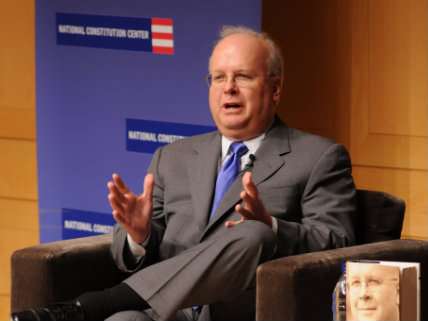Karl Rove Group Attacks Democrats—For Wanting to Cut Entitlements

Over the past two weeks, Crossroads GPS, the Karl Rove-fronted mega-group devoted to putting Republicans in office, has launched multiple ads hitting vulnerable Senate Democrats Mark Pryor (Ark.) and Kay Hagan (NC) for their positions on old-age entitlements Social Security and Medicare.
You can understand why a Republican group might go after Democrats on these issues. Far more than Obamacare, Medicare and, to a lesser extent, Social Security are the nation's two biggest long-term fiscal problems, its most significant drivers of long-term debt, and arguably the hardest government programs to reform.
Here's the funny part. Crossroads is knocking both Democratic candidates from the left—criticizing both candidates for wanting to cut and reform entitlements.
"It's troubling that Senator Mark Pryor said we should overhaul Social Security and Medicare," the first ad says.
"Kay Hagan is a 'big believer' in a controversial plan that raises the retirement age, reduces the home mortgage deduction, and increases out-of-pocket Medicare costs," the other ad charges. From the dark music to the accusatory tone of the narrator, it leaves little doubt that this supposed to be a bad thing.
Watch the ad below:
We've seen this strategy before. In 2012, GOP presidential candidate Mitt Romney ran on a promise to "protect Medicare," and attacked President Obama for cutting Medicare to pay for Obamacare.
There are all sorts of issues here. One is that the ads are exaggerating the cuts and reforms the two Democrats support. As The Washington Post's Greg Sargent (who has written about both ads already) noted recently, the first ad is based on an interview in which Pryor talked hypothetically about raising Social Security's retirement age for today's teenagers. The second ad plays on Hagan's support for the Simpson-Bowles debt reduction framework, a Beltway-favorite plan to raise taxes and tweak the entitlement system into something like sustainability over the next six decades. The retirement age would rise with glacial speed, going from 65 to 69 between now and 2075.
This is what Republicans are telling people to vote against: hypothetical entitlement reforms and benefit tweaks that take decades to implement.
Yes, there were problems with the Simpson-Bowles plan, and reasonable people can disagree on its merits and particulars. But in this case, it's a mistake to worry too much about the details, which are secondary at best. Instead, it's important to focus on the essence of the ad, its lizard-brain appeal to a kind of inchoate fear of collapse and change.
It is almost totally incoherent. In a delightfully absurd twist, the second ad also goes after Sen. Hagan for "voting for trillions in wasteful spending and debt." This is like criticizing someone for being anti-sunshine and then immediately warning that she supports a plan to ban clouds.
Sure, the ad sticks carefully the word "wasteful" in the mix, and alludes to Hagan's spending priorities, but again, the details aren't the point. If rising federal debt is the problem, the cutting federal spending on Medicare is eventually going to be necessary. There's no way to solve the federal debt problem without touching Medicare.
Too many Republicans don't know how to talk about entitlement reform, or at least really don't want to. You can see that inability on display in this local news interview with Elise Stefanik, a Republican candidate for Congress in New York. She talks about preserving and protecting entitlements, promises no cuts for those at or near the retirement age, and then literally cuts off the interview and walks away when pressed for more details.
Here's what you learn from all this: that the Karl Rove-wing of the Republican party is happy to mislead and exaggerate in order to attack Democrats, that the Bush-era party establishment's commitment to fiscal reforms remains puddle-deep, that at least through the mid-terms the GOP aims to be the party of seniors, that parts of the party remain unwilling to discuss even the most basic details of the reforms they claim to support, and, most importantly, that Republicans are likely still far from making anything like a meaningful and unified push on entitlement reform.
Not everyone in the party is playing the game like this. As with just about every issue right now, Republicans are fractured and confused on how to handle entitlements. But with these sorts of well-funded ads (the Hagan spot is a $1 million ad buy), influential parts of the party are making it more difficult to sort out that confusion by walling off even the most timid of reforms.
And even more than that, these ads illustrate the ways that the Republican party is still struggling to figure itself out while offering a glimpse into the state of policy discourse—not so much on the broader right, but within certain factions of the GOP power structure. These shallow, shell-game attack ads are meant to play on voter fear and confusion about important policy details, but what they end up revealing is the party's own fear and confusion about how to answer some of the biggest policy questions of the day.
